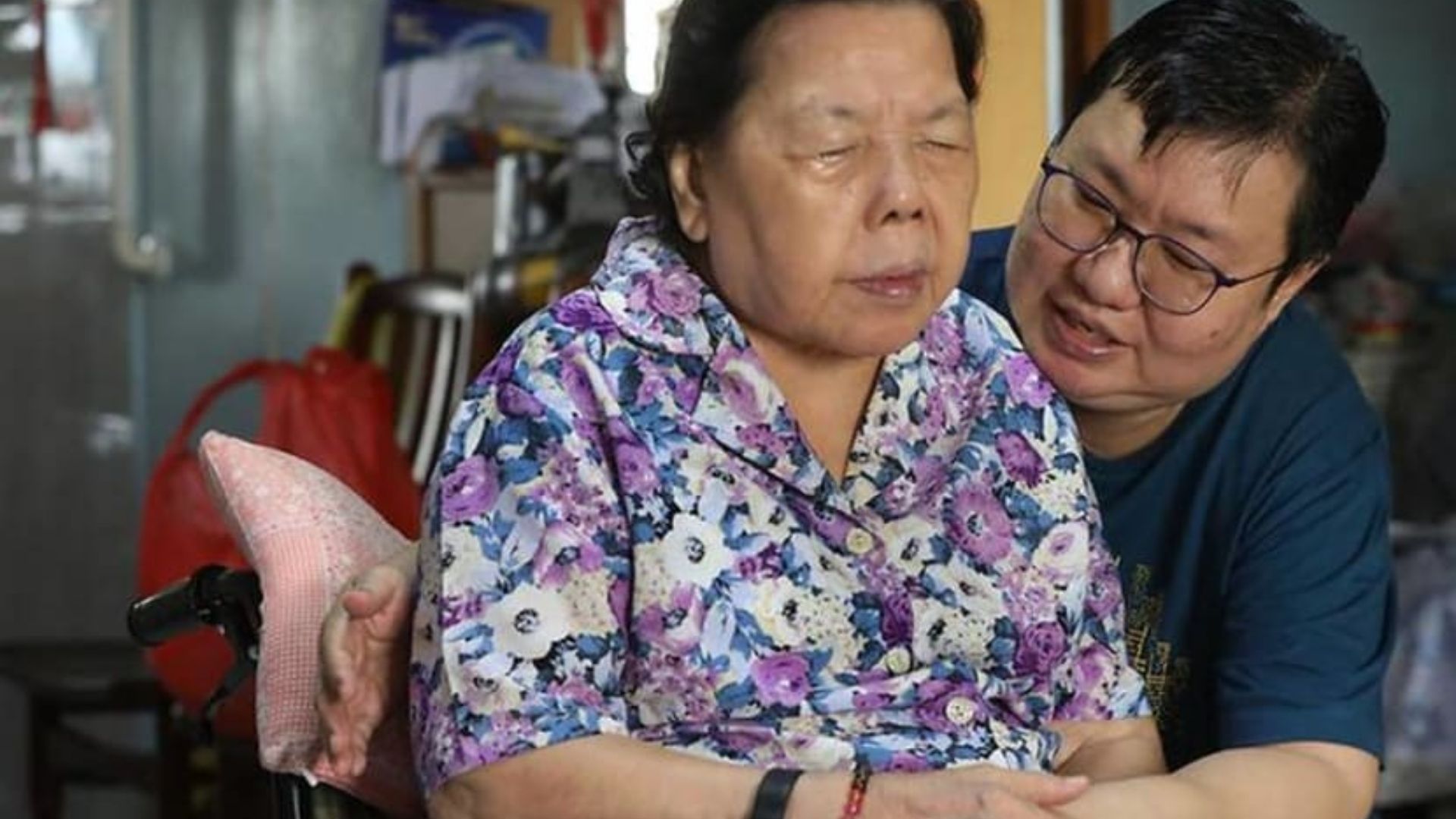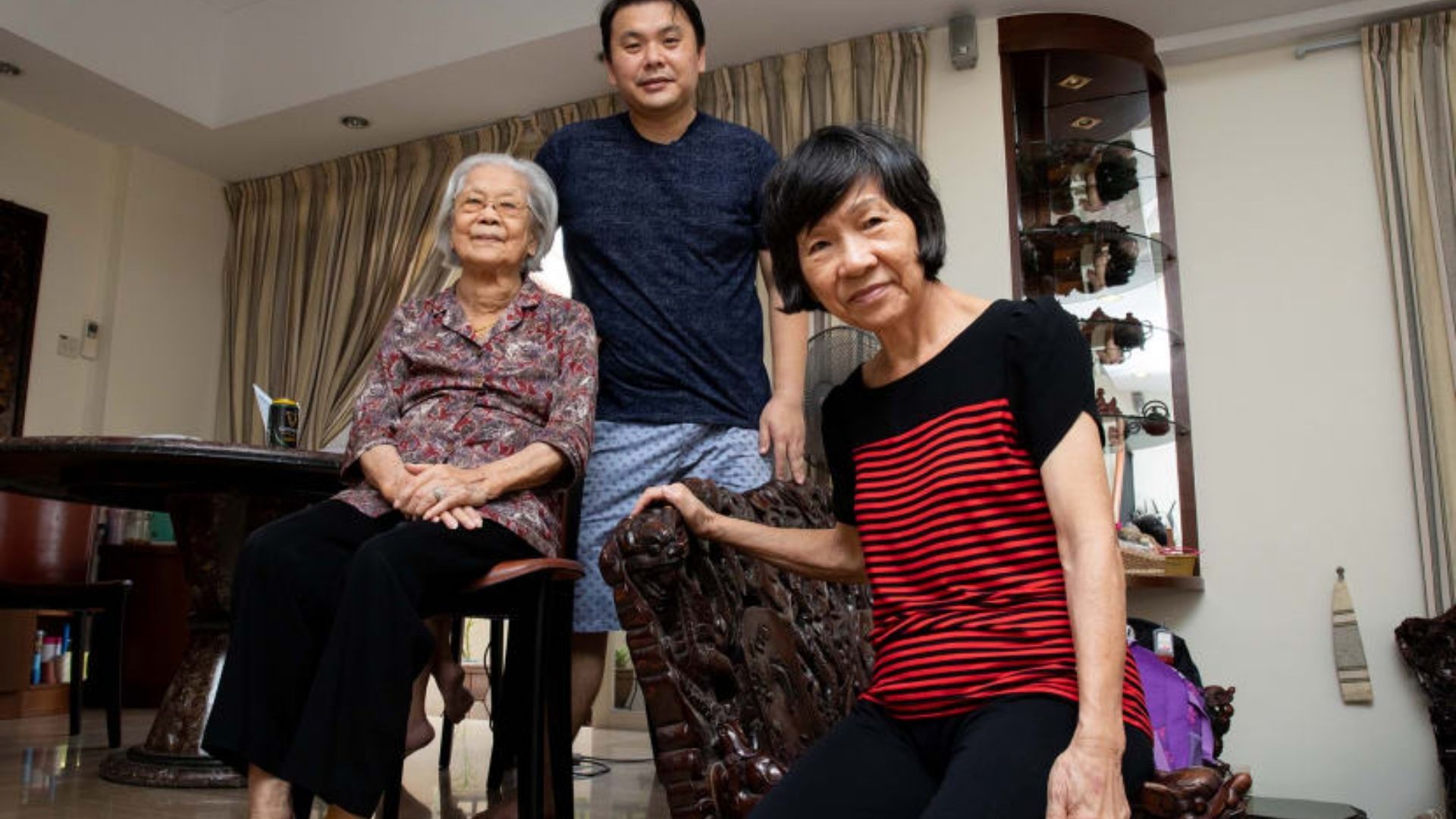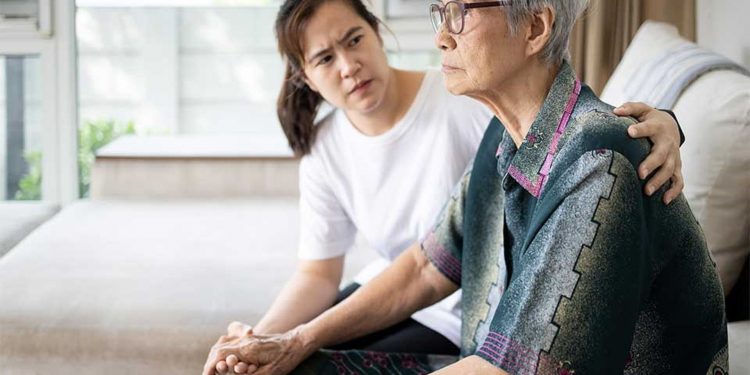Taking care of an elderly parent can be stressful, even if the senior is still healthy. Dealing with their quirky habits and behaviours can take a toll on the caregivers, especially when they need to juggle work and caregiving with little or no additional help.
Now imagine caring for an elderly parent with debilitating conditions such as dementia or Parkinson’s Disease. This can turn out to be particularly challenging and result in severe negative health effects on the caregiver herself.
Stressful times
Before his helper went through advanced training to take care of his mother, Mr Ian Poulier, 57, found it difficult to juggle his work as a counsellor and the demands of caring for her.
“I found it very draining, especially after a long day of counselling. Mum’s issues began as soon as I arrived home and I had to quickly switch to caregiving mode and tend to her needs, which could sometimes take up to two hours.
“I then had to take care of my work and often worked late into the night before getting ready for the next day and the cycle repeats,” he says.
“One warning sign was when my GP suddenly noticed that my blood pressure was unusually high during my routine medical examination. She said that with those blood pressure figures, it was a miracle that I did not succumb to a stroke! My varicose veins, which had been a problem with me since my 40s, also became more serious and I was admitted to have them stripped,’’ he adds.
The importance of self-care
Mr Poulier’s doctor, who was mindful of what he was going through at home, told him that it was “not wrong to indulge in some self-care” because he could not effectively take care of his mother if he was not taking care of himself.
He now works from home, saying the flexibility enables him to cooperate with the helper in caring for his mother. He also takes short walks around his estate every morning for his own well-being.
But this has come at a cost to his earnings, and his savings are also being depleted.
“But Mum’s care costs have a lot of savings and rebates, thanks to the CHAS and Pioneer Cards that she has. But during 2020 and 2021, while the Covid-19 pandemic restrictions were enforced, Mum was taken to hospital several times and was warded for a few days each time, so the bills were quite high. But they got paid eventually,” he adds.

Another family caregiver who tended to an elderly parent at the expense of her own health is Ms Jasmine Chua.
After her father died of cancer in 2017, Ms Chua thought she could strike a balance between caring for her 84-year-old dementia-stricken mother and working part-time as a clinic assistant, even though she often ran low on sleep as the elderly woman kept her up at night chatting.
She eventually quit her job to look after her mother full-time, while her married siblings provide financial support.
A year since her situation was reported by CNA, Ms Chua tells TheHomeGround Asia that her mother’s dementia has stabilised but her caregiving duties, coupled with the isolation that resulted from the Covid-19 pandemic restrictions, have caused her to feel more uneasy and reluctant to leave her home, even for leisure activities such as long walks and cycling.
‘’I follow several apps that help with relaxing activities such as minute-long reflections, soothing music, and simple exercises that help me relax and go to sleep without feeling anxious. Now that the restrictions are lifted, I hope to visit a therapist or counsellor for more personal treatment and advice,’’ she says.
Also in the same boat is former behavioural therapist Henry Koh, who is in his 40s. Mr Koh took a significant pay cut when he quit his job as a behavioural therapist and opted for a flexible work arrangement as a consultant to better care for both his 76-year-old mother and 95-year-old grandmother, who have been diagnosed with dementia.

When the pandemic hit, it took a big toll on his finances as patients cut back on their sessions. He also could not avail himself to many of the grants and subsidies available to help individuals and corporations tide over the pandemic because he lives in a landed property.
Financial support
To ease his financial burden and offset the cost of caregiving training courses, Mr Koh tapped on the $200 Caregivers Training Grant, administered by the Agency for Integrated Care (AIC).
There are other grants available, such as the Home Caregiving Grant (HCG) that provides caregivers with a S$200 monthly cash payout to defray caregiving expenses, such as the costs of eldercare services or hiring of a foreign domestic worker, but he is not eligible.
Mr Koh said that while he was better able to give quality care to his mother and grandmother, he remembered the times when he just wanted to quit or “check out”, particularly on days when he found it almost impossible to care for both women.
“I am glad my circle of close friends, many of whom have been with me since our primary school days, stay in close contact and I check in with them when these thoughts hit me. I am also glad for my faith and family. They help me cope with the worst of situations,” he says.
Self-help for caregivers
While caring for a loved one can be rewarding, it also involves many stressors and since caregiving is often a long-term challenge, the emotional impact can snowball over time. Decades of caregiving responsibilities can be particularly disheartening if the caregiver feels that she is in over her head, and that it is hopeless that the elderly parent will get better despite the best efforts.
If the stress of caregiving is left unchecked, it can take a toll on health, relationships, and state of mind—eventually leading to burnout, a state of emotional, mental, and physical exhaustion. And when the caregiver gets to that point, both she and the person she is caring for suffer.
To help prevent that, DayOne, a new programme launched by KK Women’s and Children’s Hospital (KKH) will enable caregivers of children with developmental needs to be screened for the presence or risk of mental health problems from this month.
The two-year programme will focus on families living in the north-east — Punggol, Sengkang and Hougang — where there is a large population of young families and children under the age of five. But caregivers who are not living in this area and show signs of having mental health needs will also be given the necessary referrals.
KKH told CNA last month that when a child is referred to a hospital to assess the possibility of developmental needs can cause high tension in caregivers. This is exacerbated when caregivers face individual challenges such as anxiety, depression and limited support.
DayOne is being run in partnership with philanthropic organisation Lien Foundation, which will be funding 75 per cent of its S$3.6 million budget.
KKH said the programme structure comprises four stages and is helmed by a 15-man multidisciplinary mental health team which includes medical social workers, psychologists and paediatricians.
Caregivers will be engaged via teleconsultations at the point of referral before they attend the clinic. Those found to be stressed will have their appointments fast-tracked and will then be screened during the first clinic visit and a four-tier support system used to identify their needs level.
Research has shown that caregivers of children with developmental needs are more likely to suffer mental health problems.
Based on KKH data of 2016, 29 per cent of mothers with children diagnosed with autism spectrum disorder continued to score above the clinical cut-off for depression within six to 12 months of the diagnosis.
Parents who perceived that caring for a child with autism has negatively impacted the rest of the family also experienced more depressive symptoms.
Associate Professor Lourdes Mary Daniel, who is head and senior consultant at KKH’s Department of Child Development, says the most crucial relationship in the child’s life is with the caregiver.
“By supporting the caregiver, the child and the father, we are in fact optimising Singapore’s human capital, by helping these children reach their full potential,” she says.
Lien Foundation chief executive Lee Poh Wah says the programme tackles two big stigmas at once — developmental needs and mental health.
“It is rooted in the reality that in young families, these two conditions are often intricately linked and need to be addressed holistically. There is no health without mental health,” he adds.
In some severe cases, caregivers may need time and space away from their charges to heal and thrive — as results of the first national survey on Singapore caregivers showed.
In 2020, a survey conducted by the Singapore Management University (SMU), with the support of Caregivers Alliance Limited (CAL), Enable Asia and the Singapore Association for Mental Health (SAMH), showed findings that indicated caregivers of persons with mental health issues expressed a need for temporary separation from the person they care for.
It also revealed that 3 in 4 caregivers are tired and exhausted caring for the person with mental health issues. Almost 9 in 10 caregivers of persons with mental health issues, and more than 9 in 10 caregivers of persons with dementia, are calling for specialised hiring and training of paid domestic helpers.
After sharing her customised survey with CAL, Enable Asia and SAMH, SMU Senior Lecturer of Statistics Rosie Ching and her 175 undergraduates collated 6,706 responses across Singapore.
The project, code-named “Care. For. Me”, sought to paint a picture of Singaporeans’ attitudes and awareness towards caregivers of those with mental illnesses including Alzheimer’s disease and related dementias.
Ms Ching says, “Many of the students and participants in Care. For. Me were very touched that time was taken to go to the ground to hear their heartfelt pleas for help and how they often felt ignored. The project was very intense and would have been very difficult to conduct during non-Covid-19 periods, but it was now doubly painful and difficult in the Covid-19 era.”
She adds: “But I was glad that an attempt was made to tear the veil over things not openly discussed nor well understood but which exerts one of the most onerous and immeasurable burdens in caregiving,” she adds.
When Ms Ching first realised the “heartfelt need that caregivers felt about being separated from their charges, even for a short while”, she initially wondered if it was a sign of becoming jaded and heartless.
“But I later learnt that the caregivers were running on empty most of the time, and it would eventually lead to tragic consequences if they could not get me time to recharge and recover. The survey brought the real importance of self-care to my doorstep, where I could see its effects. So, I hope that the statistics will spark greater understanding of our caregivers, or carers as I prefer calling them, and improvement to their well-being,” she says.
RELATED: Recognising caregiver sacrifice
Join the conversations on TheHomeGround Asia’s Facebook and Instagram, and get the latest updates via Telegram.












